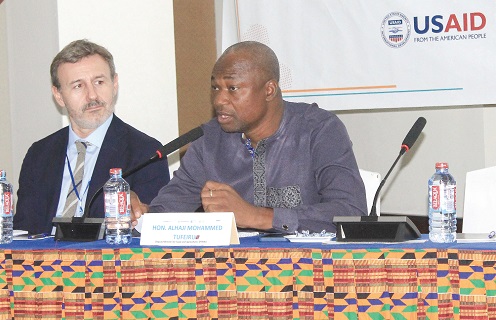Farmer-led irrigation development is crucial to sustaining irrigation systems in Africa which is key to stable food production, the Minister of Food and Agriculture, Bryan Acheampong, has said.
He said it was in line with this that the government was constructing dams, particularly in the northern regions to provide all year-round water sources for small-scale irrigation, livestock and domestic uses in smallholder communities.
The minister said this in a speech read on his behalf at a two-day African conference on irrigation in Accra.
The conference was attended by stakeholders from across the agricultural sector in Africa who discussed and shared experiences on irrigation practices.
It was also aimed at creating synergies, accelerating efforts and boosting farmer-led irrigation development (FLID) for increased productivity in Africa.
Organised by the International Water Management Institute (IWMI), stakeholders explored strategies to address barriers and gaps in the system through new knowledge and investment actions for the next five years.
It was on the theme: “Sub-Saharan knowledge exchange conference”, and jointly sponsored by a USAID-funded innovation lab for small-scale irrigation (ILSSI), CGIAR Initiative on West and Central African Food Systems Transformation, Water and Energy for Food, both CSOs, and the World Bank.
Awareness creation
Mr Acheampong said his outfit would increase awareness of the role of farmer-led irrigation as it worked to increase support to farmers in the country.
“We recognise the four pathways to advancing irrigation development in Africa. Within the ministry, the Ghana Irrigation Development Authority (GIDA) oversees all irrigation systems in the country, including small-scale farmer-led irrigation development,” he said.
Significance
The Country Representative of IWMI West Africa, Dr Olufunke Cofie, said FLID was a solution to building climate resilience for smallholder farmers.
She said it also transformed food systems, given the various efforts in research implementation and investment across Africa.
Dr Cofie said it was, therefore, important to bring stakeholders together to exchange lessons learned among implementers, investors and researchers.
“We are coming together to share experiences, good practices, findings from research and interventions.
“To transform the food system we must not neglect this category of farmers who may need improved technology such as solar panels to succeed,” she added.


